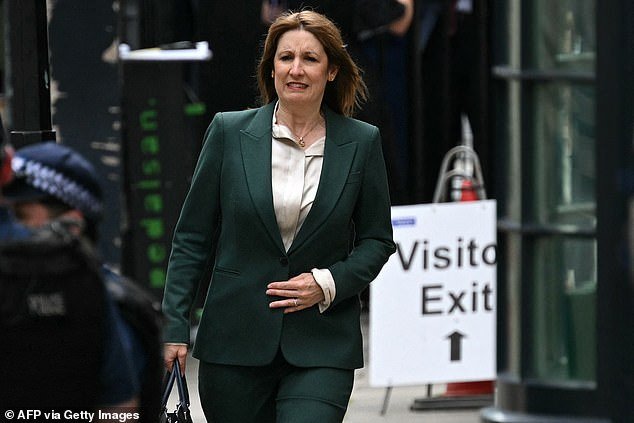Labour left-wingers have laid out a menu of tax hikes to fund even more government spending.
Keir Starmer has urged to raise up to £120billion from Brits by increasing national insurance again, targeting banks and hammering shareholders.
The laundry list of raids – equivalent to adding 14 per cent to the government’s total tax take last year – emerged as Rachel Reeves desperately scrambles for ways to balance the books.
But it is highly uncertain whether the suggestions would bring in the amounts claimed, with the Treasury’s OBR watchdog already warning ministers against relying on milking huge amounts from a few thousand ‘mobile’ wealthy people.
Alarm has been growing in government over how to fill an estimated £30billion hole in the public finances at the Autumn Budget.
The Chancellor seems to have been backed into a corner after the PM bowed to a massive Labour revolt against welfare curbs.
She has vowed to stick to her fiscal rules on borrowing, and said Labour will keep the manifesto pledge not to hike taxes on income tax, employee national insurance or VAT.
But Ms Reeves has acknowledged there will be a ‘cost’ to U-turns on benefits and winter fuel allowance.

Chancellor Rachel Reeves seems to have been backed into a corner after the PM bowed to a massive Labour revolt against welfare curbs

The tax burden is already set to hit a new high as a proportion of GDP after the last Budget imposed a £41billion increase – the biggest on record for a single package

The tax burden is already set to hit a new high as a proportion of GDP after the last Budget imposed a £41billion increase – the biggest on record for a single package
The tax burden is already set to hit a new high as a proportion of GDP after the last Budget imposed a £41billion increase – the biggest on record for a single package.
And the respected IFS think-tank has warned the stalling economy means the looming tax increases might need to be on a similar scale.
Sir Keir refused to rule out extending the long-running freeze on tax thresholds as he was grilled by Kemi Badenoch in the Commons today.
The move could raise around £10billion a year by dragging millions of Brits deeper into the tax system.
However, the Left of his party are encouraging Sir Keir to be more radical in his approach.
Posting on social media this week, Labour backbencher Nadia Whittome gave a list of 10 tax increases that had been floated by colleagues as alternatives to disability benefit cuts.
‘The problem is an exploitative, extractive economic system rigged against most people and our planet. The solution is not further cuts – we need to tax extreme wealth instead,’ she said.
She claimed that equalising capital gains tax rates with income tax rates could bring in £12billion a year, and ending ‘stealth subsidies for banks’ £50billion.
Taxing gambling to raise £3.4billion was another option cited, while stopping ‘rich multinational corporations evading tax and mandating that they declare their profits wherever they operate’ would apparently bring in £15billion.
Applying NICs to investment income was credited with boosting Treasury coffers by £10.2billion, scrapping fossil fuel subsidies for oil and gas companies £2.2billion, and taxing private jets £1.2billion.
Ms Whittome referenced proposals to abolish a ‘carried interest loophole’ for private equity bosses so they ‘pay their fair share’, and mentioned a 9. 4 per cent tax on share buybacks – suggesting those measures could raise hundreds of millions of pounds more.

Sir Keir refused to rule out extending the long-running freeze on tax thresholds as he was grilled by Kemi Badenoch in the Commons today
The MP added that ‘many of us’ have called for a 2 per cent tax on assets worth more than £10million, which was valued as a £24billion boost.
In a report on fiscal risks published yesterday, the OBR warned that the public finances looked to be ‘unsustainable’ in the longer term with debt on track to hit 270 per cent of GDP by the 2070s.
The watchdog said it had previously raised concerns about the ‘narrowing of tax bases’ where revenues were ‘reliant on a smaller group of taxpayers’.
‘The changes focused on high-net-worth individuals include the reforms to the non-domicile regime in the March and October 2024 Budgets, which were estimated to boost receipts by a peak of £13.1 billion in 2027-28, mostly from a population of under 10,000 individuals,’ the report said.
‘In addition, changes to capital gains tax at the October 2024 Budget were forecast to increase revenues by £2.5billion in 2029-30, with a majority of the revenue coming from the under 6,000 taxpayers making gains larger than £2million each year.
‘Higher earners’ behavioural responses to tax changes are more uncertain and potentially higher than assumed in costings.
A growing reliance on this small and mobile group of taxpayers therefore represents a fiscal risk.’


























